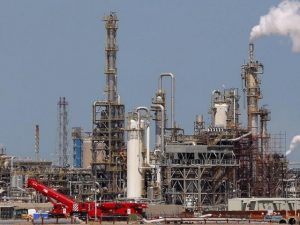The long-awaited policy on refineries has been finalized.
It will offer tax breaks and other incentives in order to encourage processing facility upgrades.

KARACHI: The government has finalised a draught of the oil refinery policy, which calls for a number of tax breaks and incentives to encourage refineries to upgrade their facilities.
Pakistan needs a new facility that can process 400,000 barrels of oil per day to meet the nation’s rising petroleum demand, yet none have been built there in the previous 40 years.
Refineries that are already in operation could benefit from upgrades by having more installed capacity to meet consumer demand.
Currently, Pakistan’s oil refineries are able to meet 55% of the country’s yearly demand for petroleum products while also saving $1 billion in foreign cash. Every day, they use over 70,000 barrels of local crude and condensate. They claim to be creating more than 100,000 chances for direct and indirect employment and contributing reasonably to the national coffers and the GDP (GDP).
Sources revealed the key components of the much anticipated refinery policy, stating that for a six-year period from January 1, 2023, to December 31, 2028, there would be a minimum customs charge of 10% on motor gasoline and diesel of all grades as well as imports of any other finished products.
From January 1, 2023 to December 31, 2028, refineries will be permitted to maintain the 10% customs duty applicable to finished goods in the ex-refinery price under the current price mechanism or the controlled price mechanism.
According to sources, 2.5% of net taxes on gasoline and 10% of net taxes on diesel, respectively, would be deposited in a refinery’s designated bank account for plant upgrades, and any customs duty over 10% would be returned to the Oil and Gas Regulatory Authority (Ogra) under the Inland Freight Equalization Margin (IFEM) framework.
If the pricing system is deregulated, the refineries will be permitted to keep the current customs duty in the ex-refinery price from January 1, 2023 to December 31, 2028, according to the proposed policy.
The applicability of prevalent customs duty to the ex-refinery price of finished products will be reconsidered if the current pricing mechanism or a controlled pricing regime continue to be in effect after December 31, 2028. The refineries will be free to establish the prices of their products if the pricing regime is deregulated after December 31, 2028.
Deposits made by refineries in accordance with clauses 6.1.2.2 and 6.1.2.3 would be retained in a separate bank account with the National Bank of Pakistan that is managed by the relevant refinery. These deposits and any markup will not be used for the current refineries’ general corporate purposes, such as dividend distribution, loss-adjustment, or other general corporate uses.
At the predetermined milestones agreed upon with Ogra, following the financial close of the upgrading project for the relevant refinery, funds in this account will be available for withdrawal. The draught policy provides for the reimbursement of any duties on oil through IFEM.
The refineries would be permitted to open and maintain foreign currency accounts for any export proceeds, subject to applicable State Bank of Pakistan (SBP) regulations and following completion of all formalities.
The proposed policy would exempt imports of machinery to be installed or materials to be used in the refinery from customs duties, surcharges, withholding taxes, general sales taxes, any other ad valorem taxes, or any other levies/duties, all without the requirement of prior Engineering Development Board certification. Similar exemptions from provincial and local taxes will be granted with the help of the federal government.
The execution of services for construction, operations, and engineering undertaken in Pakistan from outside the nation in relation to the upgrading project will be exempt from provincial and federal taxes for foreign contractors or subcontractors.
According to the Income Tax Ordinance of 2001, refineries will be exempt from the requirements for withholding tax on payments made to non-resident individuals (including the contractor or a partner of the contractor) on account of the purchase of machinery or equipment that will be used in the project.










































